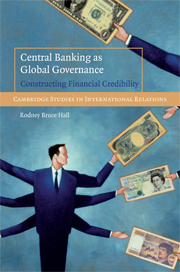Book contents
- Frontmatter
- Contents
- Preface
- 1 Central banking as governance
- 2 The social character of money
- 3 Instituting facts and constituting rules
- 4 Constitutive power relations
- 5 Rules and international monetary systems
- 6 Central bank independence as credibility
- 7 Transparency and intersubjectivity in central banking
- Bibliography
- Index
- Cambridge Studies in International Relations
- References
7 - Transparency and intersubjectivity in central banking
Published online by Cambridge University Press: 03 May 2010
- Frontmatter
- Contents
- Preface
- 1 Central banking as governance
- 2 The social character of money
- 3 Instituting facts and constituting rules
- 4 Constitutive power relations
- 5 Rules and international monetary systems
- 6 Central bank independence as credibility
- 7 Transparency and intersubjectivity in central banking
- Bibliography
- Index
- Cambridge Studies in International Relations
- References
Summary
You mean to tell me that the success of the [economic] program and my reelection hinges on the Federal Reserve and a bunch of [expletive deleted] bond traders?
William Jefferson ClintonI used to think if there was reincarnation, I wanted to come back as the President or the Pope or a 400 baseball hitter. But now I want to come back as the bond market. You can intimidate everyone.
James Carville“The word honor in the mouth of Daniel Webster,” said Senator John Randolph of Virginia (on the Senate floor, too) “is like the word love in the mouth of a whore.” I have some of that feeling when I hear a central banker recommend “transparency.”
Martin MayerBanking is a pervasive phenomenon, not something to be dealt with merely by legislation directed at what we call banks. The experience with the control of note issue is likely to be repeated in the future; many expedients for controlling similar practices may prove ineffective and disappointing because of the reappearance of prohibited practices in new and unprohibited forms. It seems impossible to predict what forms the evasion might take or to see how particular prohibitions might be designed in order that they might be more than nominally effective.
Henry C. SimonsTransparency in systems of monetary governance
Having developed the relationship between trust and authority as pertains to central banking, I now turn to the relationships between trust and authority that are applied to the other major actors engaged in the specification of money's “functions” in the domestic and global economies.
- Type
- Chapter
- Information
- Central Banking as Global GovernanceConstructing Financial Credibility, pp. 189 - 235Publisher: Cambridge University PressPrint publication year: 2008

